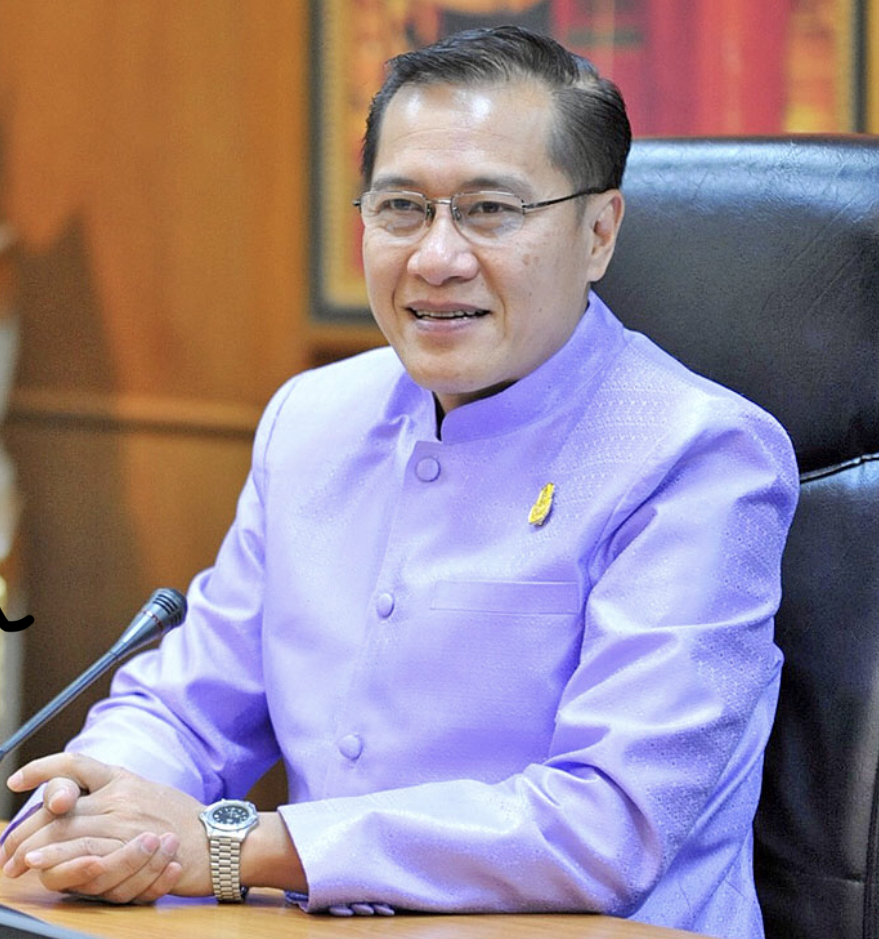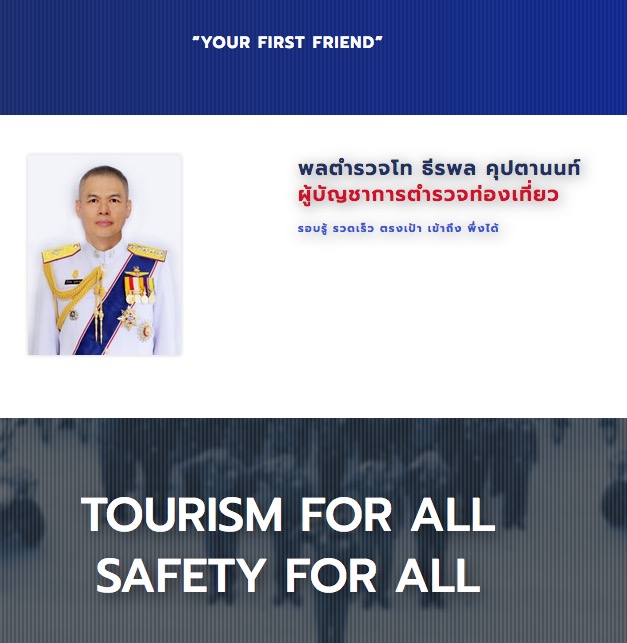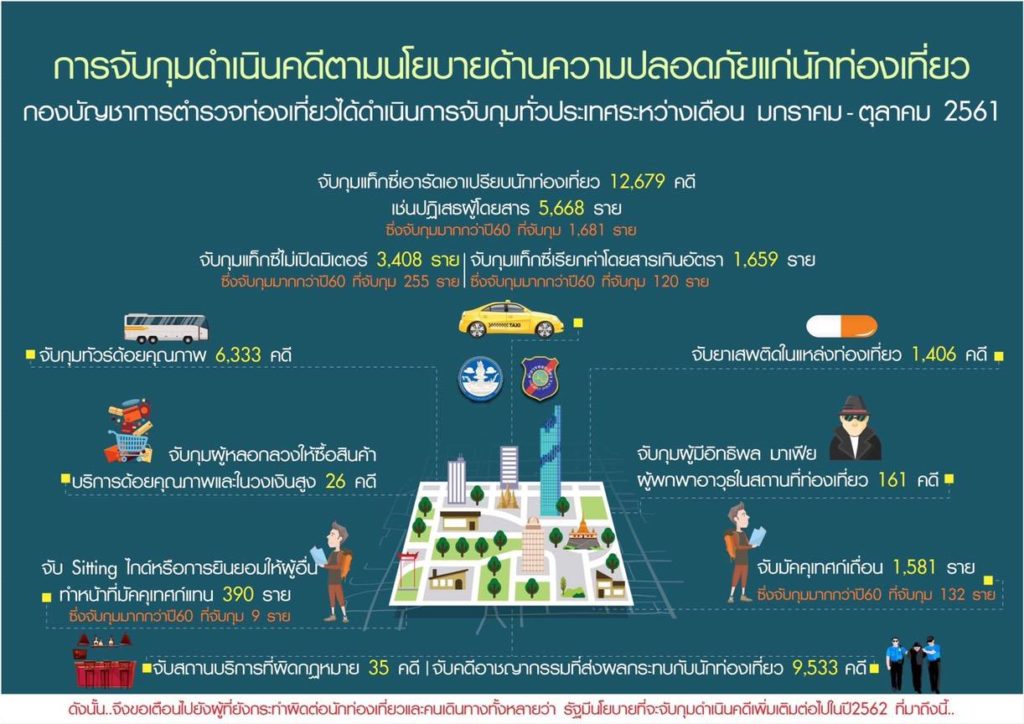
8 Jan, 2019
In “disruptive” move, Thai Tourism Minister publishes stats on scams, cheats and rogue cabbies
Bangkok – Thai Tourism Minister Weerasak Kowsurat has taken an extraordinarily “disruptive” step by publicly releasing the results of a crackdown by the Thai Tourist Police on hundreds of scams, frauds and other illegal actions faced by visitors to Thailand between Jan-October 2018.
 Mr Weerasak Kowsurat |
This is arguably the first time that any Tourism Minister worldwide has put such statistics in the public domain. He said they were among “a whole lot more data” presented to him, “but I chose to present just a few figures” that the tourism industry should be aware of. “Full credit goes to the Tourist Police,” he said.
In line with the Government policy to enhance safety and security and upgrade the “quality” of Thai tourism products and services, the Tourist Police has accelerated its crackdown on a wide range of complaints and crimes faced by visitors to Thailand.
The Tourist Police website features a lot of news and success-story updates in Thai but this is the first time such figures have been released in copious detail.
These offenses are not unique to Thailand. Visitors everywhere, including on the streets of European cities, fall victim to pickpockets, scammers, bag-snatchers, muggers, con-men, illegal guides, etc. However, all destinations sweep the figures under the carpet in order not to dent their marketing campaigns portraying local people as being friendly, hospitable and service-minded.
This makes the problem worse by lulling visitors into a false sense of complacency. Officialdom, too, does not face public outrage and pressure to give it the importance it deserves.

Screenshot from the Tourist Police website. The unit is headed by Commander Teeraphol Khuptanon.
Acting on the basis of the common-sense policy that the first step towards solving a problem is to recognise that there is one, the Thai Tourism Minister has opted to disrupt that mindset. The figures are quite startling. Between Jan-Oct 2018, the Tourist Police dealt with:
– 6,333 cases of low-quality tour operators.
– 26 cases of rip-offs (tourists being conned to buy low quality products and services at high prices).
– 12,679 cases of taxi drivers misconduct, such as rejecting passengers 5,668 cases. (1,681 cases in 2017).
– 3,408 cases of taxi drivers refusing to turn on the meter (255 cases in 2017).
– 1,659 cases of taxi drivers over-charging fares beyond the normal rate. (120 cases in 2017).
– 35 cases of illegal service establishments.
– 1,406 cases of drugs in tourist attractions.
– 9,533 cases of crimes against tourists.
– 161 cases of Mafia and “influential persons” carrying weapons in tourist attractions.
– 1,581 cases of illegal tour guides (132 cases in 2017)
– 390 cases of “sitting tour guides” who allow others to (illegally) act as tour guides (9 cases in 2017).
The figures were published as an infographic by the Tourist Police along with an accompanying warning in red font: “So be warned, all those who still commit crimes against tourists and travellers that the state has a policy to make further arrests and prosecutions in the year 2019.”

Editor’s comment: Will other Tourism Ministers now rise to the challenge?
This “disruptive” action by the Thai Tourism Minister is the first time such reality-check stats have been put into the public domain since former TAT Chairman Mechai Viravaidhya cited statistics on Thailand’s then deadly AIDS crisis in 1990-91 to warn of the long-term threat to Thai tourism.
It will have a positive global ripple-effect by forcing a robust discussion of some of the most common and yet entirely ignored problems faced by tourists worldwide. Organisations such as PATA and the UNWTO, which claim to be full of “visionary thought-leaders and creative thinkers”, have historically never organised a single event to discuss it.
That may be about to change.
Politically, a Tourism Minister is the country’s salesman-in-chief. He is not supposed be airing what some would consider to be the negative side of tourism.
While the marketing themes of friendly, hospitable, service-minded locals may be true in the overwhelmingly vast majority of interactions between visitors and local people, there is always a small minority of crooks, charlatans and thugs in every country well-skilled in exploiting the gullibility and complacency of foreign guests.
Tourism marketing messages are in fact promises. When visitors are conned or scammed, those promises stand violated. Which is why sweeping the problems under the carpet makes no policy sense. Every victim tells dozens of friends, families and colleagues, both directly and via social media. That only worsens the image of the country.
Thailand’s visitor arrivals have nearly doubled in the last 10 years. For sure, this growth would lead to a commensurate rise in scams and crimes. Indeed, they comprise the bulk of the complaints received annually by the Tourism Authority of Thailand. Being just a marketing organisation with no law-enforcement powers, the TAT can only refer the complaints to the authorities.
In fact, the stats are only skimming the surface. They do not include other more serious crimes and accidents such as credit-card fraud, rapes and drunk-driving casualties.
It is not just the locals. Thailand’s relaxed visa policies also attract various kinds of criminals from all over the world. Local newspapers regularly report incidents of paedophiles, organised crime racketeers and other fugitives from justice being arrested in Thailand.
The Minister has done the right thing. As the Tourist Police are serious about doing their job, in line with the policy to promote Thailand as a quality tourism destination, there is no reason why the results should not be publicised.
A few days ago the minister had a morale-boosting lunch with a group of young volunteers who were part of the Tourist Assistance Centre. He has also announced a major effort to upgrade many other weaknesses in Thailand’s traditionally lax safety and security systems.
If Tourism Ministers in other countries follow suit, this show of disruptive transparency can lead to positive change system-wide.
For example, taxi drivers in many cities are seeking bans on ride-sharing services. However, concrete stats of misconduct by their own brethren reverses the onus of accountability. Visitors find ride-sharing services a good way to avoid potentially rogue taxi drivers. Unfortunately, good taxi-drivers get tarred with the same brush. Everyone loses.
So, instead of wailing about how ride-sharing services are hurting their business, the taxi companies and cooperatives need to explain what they are doing to police their own.
The show of ministerial transparency will also pave the way for other so-called negative figures to be released, such as the environmental damage done by tourism in the form of food waste, garbage production and water consumption. These, too, contradict the marketing imagery of pristine beaches and fresh air/greenery. If they are aired, the resulting wake-up jolt could do more to meet some of the core UN Sustainable Development Goals than any number of training courses.
Visitors, too, will benefit by being forewarned and forearmed. Heightened awareness and caution can go a long way towards helping them avoid these problems in the first place.
Finally, the imbalanced content of the safety and security agenda has to change. The long-standing focus has been on terrorism, sponsored by hardware companies trying to make a buck selling their wares. But more grassroots challenges such as scams and rip-offs faced by tourists on virtually a daily basis are far more problematic.
Perhaps the release of these figures will lead to a narrowing of the chasm in attention levels.
Mr. Weerasak has said publicly that he is trying to fix numerous underlying problems faced by the Thai tourism industry before a national election to be held sometime this year. He has just taken a major step forward in that direction.



Liked this article? Share it!